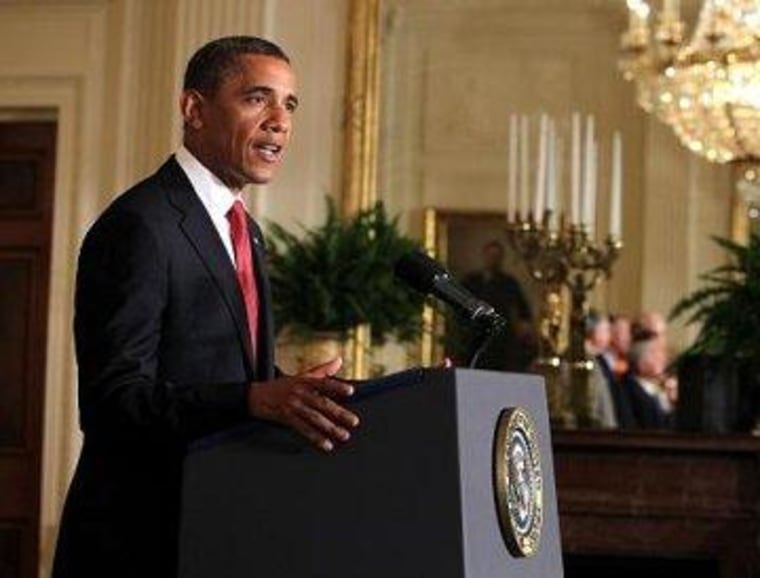As has been well documented, the Bush-era tax breaks, which were set to expire two years ago, are now scheduled to disappear on Dec. 31. Heightening the drama, the expiration of the lower tax rates coincide with massive automatic spending cuts -- part of last year's debt-ceiling deal -- creating the conditions for a huge mess.
We have some sense of what congressional Republicans want, namely making all Bush-era tax breaks permanent, but what does President Obama have in mind? Today, the White House plan comes into focus.
With a torpid job market and a fragile economy threatening his re-election chances, President Obama is changing the subject to tax fairness, calling for a one-year extension of the Bush-era tax cuts for people making less than $250,000. [...][B]y calling for an extension for just a year, Mr. Obama hopes to make Republicans look obstructionist and unreasonable. Trying to bounce back from another weak jobs report on Friday, he also hopes to deepen the contrast with his challenger, Mitt Romney. On Friday, the president said Mr. Romney would "give $5 trillion of new tax cuts on top of the Bush tax cuts, most of them going to the wealthiest Americans."
House Republicans are preparing a vote to make all of the lower rates permanent -- a proposal the White House swears up and down the president will not tolerate, and which the Senate probably can't pass anyway.
In the process, the larger fight is taking shape, with Obama looking out for tax breaks for the middle class, while GOP policymakers champion breaks for the wealthiest of the wealthy. It's also certain to become a key element of the 2012 presidential campaign -- Mitt Romney has reintroduced the "job creators" euphemism -- though most polling suggests Obama's approach enjoys far more public support.
Indeed, it's worth remembering that Obama's approach -- lower rates for those below $250,000, Clinton-era rates on income above $250,000 -- sounds familiar because it is familiar: he presented this same policy as a candidate in 2008. That position was eventually compromised away in the face of GOP intransigence, but now it's back.
This time, Obama's aides insist he'll be far less inclined to cave, especially since most of the negotiations are likely to occur after the election.
But that raises a related question: if it's nearly certain that this fight will be pushed off until the lame-duck session, why is the president staking out this position now? The answer, I suspect, is that Obama believes his proposal will be the politically popular one. It puts Republicans, from Romney to Capitol Hill, in the position of effectively arguing, "Middle-class tax cuts are nice, but we're going to the wall to fight for the top 2%."
That's what Obama wants them to do, especially before the election. If Republicans balk at a proposed middle-class tax cut, the president believes that helps him by reinforcing the worst suspicions about GOP priorities.
Given the larger context -- Romney's offshore investments, his out-of-touch elitism, his comically tone-deaf donors, his fat-cat supporters trying to buy him the keys to the White House -- it's a fight the president's team feels good about. He'll speak for the middle class; Romney can speak for the elite.
* Postscript: Keep in mind that this is very much another game of chicken. Obama's line is, "Give me the middle-class tax breaks." The GOP line is, "Give us the tax breaks for the wealthy or everyone's taxes go up." It's a test to see who'll blink first, and if no one blinks, everyone goes back to paying Clinton-era tax breaks early next year, and the deficit starts shrinking very quickly.
